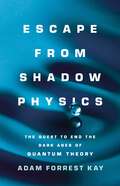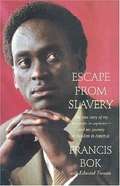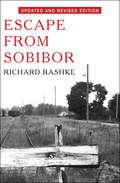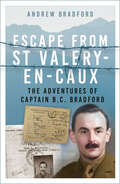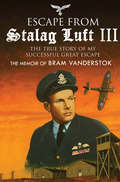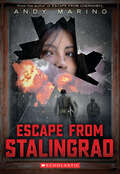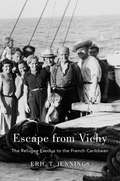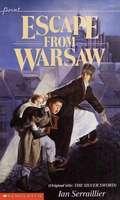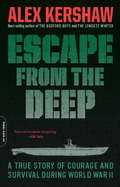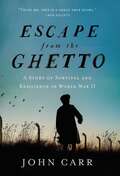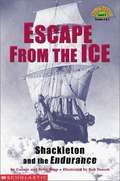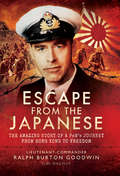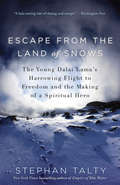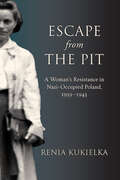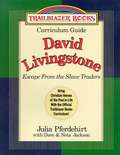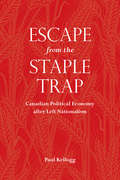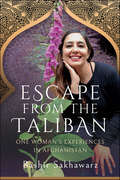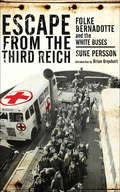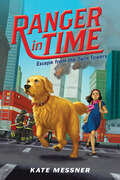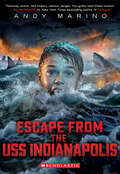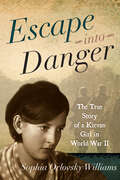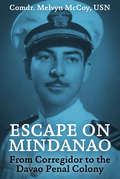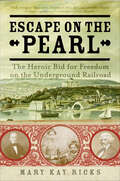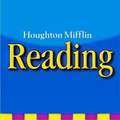- Table View
- List View
Escape from Shadow Physics: The Quest to End the Dark Ages of Quantum Theory
by Adam Forrest KayThis "artfully written...splendid history of classical and quantum physics" (Science) that "rightfully highlights the limitations of current physics" (Wall Street Journal) and argues for a revolutionary new understanding of quantum mechanics The received wisdom in quantum physics is that, at the deepest levels of reality, there are no actual causes for atomic events. This idea led to the outlandish belief that quantum objects—indeed, reality itself—aren&’t real unless shaped by human measurement. Einstein mocked this idea, asking whether his bed spread out across his room unless he looked at it. And yet it remains one of the most influential ideas in science and our culture. In Escape from Shadow Physics, Adam Forrest Kay takes up Einstein&’s torch: reality isn&’t mysterious or dependent on human measurement, but predictable and independent of us. At the heart of his argument is groundbreaking research with little drops of oil. These droplets behave as particles do in the long-overlooked quantum theory of pilot waves; crucially, they showcase quantum behavior while being described by classical physics. And that classical-quantum interface points to a true understanding of quantum mechanics and a reasonable universe. A bold and essential reset of the field, Escape from Shadow Physics describes the kind of true scientific revolution that comes along just once—or less—in a century.
Escape from Slavery: The True Story of My Ten Years in Captivity -- and My Journey to Freedom in America
by Francis Bok Edward TivnanThis groundbreaking autobiography, Francis Bok shares the riveting history of his brutal capture and enslavement, his desperate escape, and his remarkable journey to freedom. Bok's extraordinary memoir describes: -The raid on his village -His horrific abduction at age seven -Numerous failed and near-fatal escapes -His successful escape to a refugee camp-followed by nine months in jail under the charge of sedition -His harrowing journey to Cairo and with the help of the UN, to freedom in America -His new life in Boston as a student and anti-slavery activist. Escape from Slavery is at once a dramatic adventure, a story of desperation and triumph, and an important commentary on the plight of millions held in slavery today.
Escape from Sobibor: Revised And Updated Edition
by Richard RashkeThis true story of a revolt at a Nazi death camp, newly updated, is &“a memorable and moving saga, full of anger and anguish, a reminder never to forget&” (San Francisco Chronicle). On October 14, 1943, six hundred Jews imprisoned in Sobibor, a secret Nazi death camp in eastern Poland, revolted. They killed a dozen SS officers and guards, trampled the barbed wire fences, and raced across an open field filled with anti-tank mines. Against all odds, more than three hundred made it safely into the woods. Fifty of those men and women managed to survive the rest of the war. In this edition of Escape from Sobibor, fully updated in 2012, Richard Rashke tells their stories, based on his interviews with eighteen of the survivors. It vividly describes the biggest prisoner escape of World War II. A story of unimaginable cruelty. A story of courage and a fierce desire to live and to tell the world what truly went on behind those barbed wire fences.
Escape from St Valery-en-Caux: The Adventures of Captain B.C. Bradford
by Andrew BradfordThe dramatic story of Captain Berenger Colborne Bradford, Adjutant of the 1st Battalion Black Watch, compiled by his son using diaries and letters, coded messages and correspondence between his family and the War Office in their desperate effort to hear news of his safety. This book tells of Captain Bradford's experiences between 1939 and 1941, during which time he was in the thick of the action in France, leading up to the surrender of the Highland Division at Saint Valery-en-Caux in June 1940. While being marched into captivity Capt. Bradford managed to escape once from the Germans and then seven further times from the Vichy French. This account details his journey to safety in Gibraltar, spanning France, Spain and North Africa, including a night crossing of the Pyrenees and an astonishing 700-mile voyage in a 17ft sailing boat.
Escape from Stalag Luft III: The True Story of My Successful Great Escape: The Memoir of Bob Vanderstok
by Simon Pearson Bram VanderstokA memoir of the most decorated pilot in Dutch history and one of the World War II POWs who fled Nazi Germany what is known as &“The Great Escape.&” On the night of 24 March 1944, Bram Vanderstok was the eighteenth of 76 men who crawled out of Stalag Luft III in Zagan, Poland. The 1963 film The Great Escape was largely based on this autobiography but—with Vanderstok's agreement—filmmakers chose to turn his story into an Australian character named Sedgwick, played by James Coburn. His memoir sets down his wartime adventures before being incarcerated in Stalag Luft III and then describes various escape attempts which culminated with the famous March breakout. After escaping, Vanderstok roamed Europe for weeks before making it back to England. Two months after escaping, he returned to the British no. 91 Squadron. In the following months he flew almost every day to France, escorting bombers and knocking down V1 rockets. In August 1944, he finally returned to his home. He learned that his two brothers had been killed in concentration camps after being arrested for resistance work. His father had been tortured and blinded by the Gestapo during interrogation. He had never betrayed his son. &“His escapes, his operations as a Spitfire pilot, his experiences as a prisoner of war, and his incredible escape crossing the Pyrenees—all are described in a breathtaking manner which made me read his book through in one sitting.&” —Prof. Dr. L de Jong, founder/director of the Dutch Institute for War Documentation &“Such a modest man, such a dramatic story—you&’ll be pulled into this absorbing account.&” —Jonathan Vance, author of The True Story of the Great Escape
Escape from Stalag Luft III: The True Story of My Successful Great Escape: The Memoir of Bob Vanderstok
by Simon Pearson Bram VanderstokA memoir of the most decorated pilot in Dutch history and one of the World War II POWs who fled Nazi Germany what is known as &“The Great Escape.&” On the night of 24 March 1944, Bram Vanderstok was the eighteenth of 76 men who crawled out of Stalag Luft III in Zagan, Poland. The 1963 film The Great Escape was largely based on this autobiography but—with Vanderstok's agreement—filmmakers chose to turn his story into an Australian character named Sedgwick, played by James Coburn. His memoir sets down his wartime adventures before being incarcerated in Stalag Luft III and then describes various escape attempts which culminated with the famous March breakout. After escaping, Vanderstok roamed Europe for weeks before making it back to England. Two months after escaping, he returned to the British no. 91 Squadron. In the following months he flew almost every day to France, escorting bombers and knocking down V1 rockets. In August 1944, he finally returned to his home. He learned that his two brothers had been killed in concentration camps after being arrested for resistance work. His father had been tortured and blinded by the Gestapo during interrogation. He had never betrayed his son. &“His escapes, his operations as a Spitfire pilot, his experiences as a prisoner of war, and his incredible escape crossing the Pyrenees—all are described in a breathtaking manner which made me read his book through in one sitting.&” —Prof. Dr. L de Jong, founder/director of the Dutch Institute for War Documentation &“Such a modest man, such a dramatic story—you&’ll be pulled into this absorbing account.&” —Jonathan Vance, author of The True Story of the Great Escape
Escape from Stalingrad
by Andy MarinoFrom the author of Escape from Chernobyl comes another fast-paced historical thriller about a city caught between an enemy army and their own brutal government.Artem lives in the sleepy city of Stalingrad, which has mostly been cut off from war with Nazi Germany—until the summer of 1942. That July, martial law is declared as the Nazis begin their unprecedented march toward the city. Artem’s older brother is a soldier in Stalin’s Red Army, so Artem is worried for his brother’s safety once he and his family have evacuated the city.Then the announcement comes. Stalin has ordered that no civilians be allowed to leave Stalingrad. The city which bears his name is an important symbol, and the Red Army believe that the soldiers defending it will fight all the harder if their families’ lives are at stake.Artem and his new friend Yuna are put to work shoring up the city’s defenses, digging trenches and building fortifications. Then, on August 23rd, the bombing begins. A massive German air raid reduces most of the city to rubble. With Stalingrad blockaded by both the Germans and their own government, escape from the coming battle seems all but impossible…
Escape from Vichy: The Refugee Exodus to the French Caribbean
by Eric T. JenningsIn the early years of World War II, thousands of political refugees traveled from France to Vichy-controlled Martinique in the French Caribbean, en route to what they hoped would be safer shores in North, Central, and South America. While awaiting transfer from the colony, the exiles formed influential ties—with one another and with local black dissidents. Escape from Vichy recounts this flight from the refugees’ perspectives, using novels, unpublished diaries, archives, memoirs, artwork, and other materials to explore the unlikely encounters that fueled an anti-fascist artistic and intellectual movement. The refugees included Spanish Republicans, anti-Nazi Germans and Austrians, anti-fascist Italians, Jews from across Europe, and others fleeing violence and repression. They were met with hostility by the Vichy government and rejection by the nations where they hoped to settle. Martinique, however, provided a site propitious for creative ferment, where the revolutionary Victor Serge conversed with the anthropologist Claude Lévi-Strauss, and the Surrealist André Breton met Negritude thinkers René Ménil and Aimé and Suzanne Césaire. As Eric T. Jennings shows, these interactions gave rise to a rich current of thought celebrating blackness and rejecting racism. What began as expulsion became a kind of rescue, cut short by Washington’s fears that wolves might be posing in sheep’s clothing.
Escape from Warsaw
by Ian SerraillierHistorical fiction. In Warsaw in 1942, the Balicki chidren watch in horror as Nazi Storm Troopers arrest their mother. With the war raging around them, they live in constant fear.
Escape from the Deep: A True Story of Courage and Survival During World War II
by Alex KershawEscape from the Deep
Escape from the Ghetto: A Story of Survival and Resilience in World War II
by John CarrThis captivating true story of one boy's flight across Europe to escape the Nazis is a tale of extraordinary courage, incredible adventure, and the relentless pursuit of freedom in the face of insurmountable challenges.In early 1940 Chaim Herszman was locked in to the Lódz Ghetto in Poland. Hungry, fearless, and determined, Chaim goes on scavenging missions outside the wire fence—where one day he is forced to kill a Nazi guard to protect his secret. That moment changes the course of his life and sets him on an unbelievable adventure across enemy lines. Chaim avoids grenade and rifle fire on the Russian border, shelters with a German family in the Rhineland, falls in love in occupied France, is captured on a mountain pass in Spain, gets interrogated as a potential Nazi spy in Britain, and eventually fights for everything he believes in as part of the British Army. He protects his life by posing as an Aryan boy with a crucifix around his neck, and fights for his life through terrible and astonishing circumstances. Escape from the Ghetto is about a normal boy who faced extermination by the Nazis in the ghetto and a Nazi deathcamp, and the extraordinary life he led in avoiding that fate. It's a bittersweet story about epic hope, beauty amidst horror, and the triumph of the human spirit.
Escape from the Ice: Shackleton and the Endurance
by Peter Roop Connie RoopDescribes the events of the 1914 Shackleton Antarctic expedition when after being trapped in a frozen sea for nine months, their ship, Endurance, was finally crushed, forcing Shackleton and his men to make a very long and perilous journey.
Escape from the Japanese: The Amazing Tale of a PoWs Journey from Hong Kong to Freedom
by Ralph Burton GoodwinTrapped in the depths of Japanese-held territory, it was rare for Allied prisoners of war to attempt escape. There was little chance of making contact with anti-guerrilla or underground organisations and no possibility of Europeans blending in with the local Asian populations. Failure, and recapture, meant execution. This was what Lieutenant Commander R.B. Goodwin faced when he decided to escape from the Shamsuipo PoW Camp in Kowloon, Hong Kong in July 1944 after three years of internment.With no maps and no knowledge of the country or the language, Lieutenant Commander Goodwin set out across enemy territory and war-torn China. Because of the colour of his skin he had to travel during the hours of darkness for much of what was an 870-mile journey to reach British India. Few of his fellow prisoners gave him any chance of succeeding, yet, little more than three months later, he was being transported to the safety of Calcutta. For his daring and determination Lieutenant Commander Goodwin was awarded the Order of the British Empire.
Escape from the Land of Snows: The Young Dalai Lama's Harrowing Flight to Freedom and the Making of a Spiritual Hero
by Stephan TaltyFor the first time here is the story of the crucible that created the Dalai Lama the world knows today: the Lama's 14-day escape from Tibet to India in 1959, an awe-inspiring feat of courage and endurance that foiled Mao's plans and created the Tibetan government in exile.
Escape from the Pit: A Woman’s Resistance in Nazi-Occupied Poland, 1939–1943 (Excelsior Editions)
by Renia KukielkaAt the end of 1944, while World War II was still raging, nineteen-year-old Renia Kukielka published her Hebrew language memoir about the Holocaust. The account may well be the first of its kind. In her powerful and raw story, she portrays life in the ghettos and her three years of wandering in disguise as a Polish Catholic, trying to escape from the German onslaught. She also recounts how she served for almost a year as a courier between ghettos for the Zionist youth movement's underground cell in Bendzin, carrying weapons, money, and messages, until she was arrested by the Gestapo in 1943. She was tortured in a high-security prison, but, after a daring escape, she was able to flee to British Mandate Palestine with other members of the resistance.Kukielka's memoir manages to combine both immediacy and hindsight. It stands out for its descriptions of life and activities outside of the ghettos and concentration camps in wartime Poland and for its focus on Zionist youth resistance to the Holocaust. It also provides a somewhat rare female perspective on the Holocaust and offers insight into how much was known about the scale of the Nazi atrocities during the war. Following the book's initial publication in Hebrew in 1944, an unauthorized English-language edition was published in the United States in 1947. The present expanded text includes a scholarly introduction, notes, and a historical afterword, which help to explain and contextualize Kukielka's personal account.Published in association with the United States Holocaust Memorial Museum.
Escape from the Slave Traders
by Dave Jackson Neta JacksonDesigned with homeschoolers and Christian educators in mind, each curriculum guide offers a Christian humanities approach to studying one Trailblazer Book and its Christian hero.
Escape from the Staple Trap
by Paul KelloggFrom fur and fish to oil and minerals, Canadian development has often been understood through its relationship to export staples. This understanding, argues Paul Kellogg, has led many political economists to assume that Canadian economic development has followed a path similar to those of staple-exporting economies in the Global South, ignoring a more fundamental fact: as an advanced capitalist economy, Canada sits in the core of the world system, not on the periphery or semi-periphery.In Escape from the Staple Trap, Kellogg challenges statistical and historical analyses that present Canada as weak and disempowered, lacking sovereignty and economic independence. A powerful critique of the dominant trend in Canadian political economy since the 1970s, Escape from the Staple Trap offers an important new framework for understanding the distinctive features of Canadian political economy.
Escape from the Taliban: One Woman’s Experiences in Afghanistan
by Bashir SakhawarzA rare first hand account of the US withdrawal from Kabul through the eyes of a civilian. Deeba first left Afghanistan in 2002, fleeing a war torn country and an abusive husband shortly after she was captured by the Taliban and nearly sold to an Arab Shaikh narrowly escaping due to a small twist of fate. In June 2021, Deeba returned to visit family in Kabul to organize the engagement of her son. Regardless of the Taliban's progress she felt safe to travel after reassurances from the Aghan and US Government's that the Taliban would not be able to take major cities. One morning, to her surprise, she awoke to the news that President Ghani had escaped and Kabul was in the hands of the Taliban, what ensued was a desperate rush to leave the city to return to the USA enduring bomb blasts and crushing crowds at the airport. This is a harrowing account of one woman caught in the US withdrawal of Kabul giving a first hand account of what it was like to be a civilian caught up in the chaos as well as giving an invaluable insight in to the life of a woman in Afghanistan.
Escape from the Third Reich: Folke Bernadotte and the White Buses
by Sune PerssonThe true story of a risky Swedish mission to liberate thousands of prisoners from the Nazis. The Swedish Red Cross expedition to the German concentration camps in March–April 1945 was the largest rescue effort inside Germany during WWII. Sponsored by the Swedish government and led by Count Bernadotte of Wisborg, the mission became known for its distinctive buses. Each bus was purposely painted entirely white, except for the Red Cross emblem on the side, so that they would not be mistaken for military targets. Due to the chaotic conditions during the last weeks of the war, it is impossible to say exactly how many prisoners were liberated by the expedition, but according to conservative figures, by May 4, 1945, at least 17,000 had been transported to Sweden by the so-called White Buses. Of these, some 8,000 were Danes and Norwegians, around 6,000 were Poles, and more than 2,000 were French citizens. This is the first book to tell the full story of this remarkable and hazardous operation. It also details Bernadotte&’s harrowing expedition to Ravensbrück concentration camp and his extraordinary negotiations with Heinrich Himmler, the Reichsführer-SS who was in charge of the German concentration camps, and tells how, during the course of these discussions, Himmler also made an offer of German surrender—an offer that was rejected by the Allies. Includes never before published photographs
Escape from the Twin Towers (Ranger in Time #11)
by Kate MessnerRanger, the time-traveling golden retriever with search-and-rescue training, travels to New York City on the morning of the 9/11 attacks.COURAGE IN THE FACE OF DANGER!Ranger has never needed his search-and-rescue training more than when he arrives at the World Trade Center on September 11, 2001. There he meets Risha Scott and her friend Max who have come to work with Risha's mother for a school project. But when the unthinkable happens and the building is evacuated, Risha is separated from her mom. Can Ranger lead Risha to safety and help reunite her family?
Escape from the USS Indianapolis (Escape From)
by Andy Marino"Nonstop action, real history, serious danger. You gotta read these books!" --Alan Gratz, #1 New York Times bestselling author of RefugeeJuly, 1945The end of World War II is finally in sight. The Nazis have been defeated in Europe, and Albie hopes that means he and his brother, Joe, can get back to normal life. Or as normal as life can be following the death of their parents. But the war against Imperial Japan still rages, and when Joe's given a new assignment on the USS Indianapolis, Albie refuses to be left behind. Even if that means sneaking aboard and heading out to sea with the crew.The voyage is cramped and hot, and Joe's furious when he discovers Albie. But then torpedoes slam through the hull, and suddenly the brothers have much bigger problems: The Indianapolis is sinking.As the chaos and horror unfold, Joe and Albie manage to get off the ship before it goes under. Then the real nightmare begins. There's not enough food or water or supplies, and the days are long with the sun beating down on them, and the nights are longer, with no escape from the cold. All Albie, Joe, and the others can do is float-and hope that help gets to them before the Japanese navy returns to finish them off.But another enemy is coming, drawn by the blood in the water: sharks. And with their arrival, every moment becomes a relentless battle to survive.
Escape into Danger: The True Story of a Kievan Girl in World War II
by Sophia Orlosvky WilliamsThis WWII memoir tells the remarkable story of a Ukrainian girl&’s perilous adventures and coming of age amid the chaos of war. Born in Kiev to a Catholic mother and a Jewish father, Sophia Williams chose to be identified as Jewish when she became eligible for a Soviet passport at age sixteen. She had no way of realizing the life-changing consequences of her decision. When Germany invaded Russia the following year, Sophia left Kiev and embarked on daring journey into Russia—surviving floods, dodging fires and bombs, and falling in love. After reaching Stalingrad, Sophia found herself stranded in a Nazi-occupied town. She was safely employed by a sympathetic German officer until a local girl recognized her as a Jew. Within days, Sophia&’s boss spirited her to safety with his family in Poland. Soon, though, Sophia was on the run again, this time to Nazi Germany, where she somehow escaped detection through the rest of the war. Her story of survival continues into the postwar years, through starting a family and business with a German soldier. But when her marriage deteriorated, even divorce was not enough to keep her vindictive and violent husband away. Throughout this difficult life, Sophia maintained the grit, charm, and optimism that saved her time and again as she made her &“escape into danger.&”
Escape on Mindanao
by Lt.-Comm. Melvyn H. McCoyEscape on Mindanao is U.S. Navy Lieutenant Commander Melvyn H McCoy's account of his wartime experiences in the Philippines: the defense and fall of Corregidor Island, the Bataan Death March, his internment in Camp Cabanatuan, his transfer to Bilibid Prison in Manila, and finally being sent to the Davao Penal Colony on Mindanao. From the Davao camp, McCoy escaped and led nine other servicemen and two Filipinos on a hazardous journey to a rendezvous with an American submarine which would take them to freedom and safety in Australia. His daily log provides an insight into the dangers the escapees faced, the difficulties in travelling in the jungles and swamps of Mindanao, harrowing encounters with Japanese patrols, and heartwarming accounts of the generosity and assistance of Filipino citizens and guerrillas along the way.For his service, McCoy was awarded the Distinguished Service Cross. The commendation read as follows: The President of the United States of America, authorized by Act of Congress, July 9, 1918, takes pleasure in presenting the Distinguished Service Cross to Commander [then Lieutenant Commander] Melvyn Harvey McCoy, United States Navy, for extraordinary heroism in action in the Philippine Islands, from 4 April to 9 July 1943. After eleven months as a Prisoner of War, and in weakened physical condition, Commander McCoy outwitted the Japanese guards on 4 April 1943, escaped from a prison camp, eluding pursuing patrols, and made his way on foot and by small boat from the vicinity of Davao to northern Mindanao. Hearing of a United States force in Misamis Occidental he contrived to reach its headquarters on foot and by launch. Arrangements for his evacuation having been made, he continued on foot through enemy-occupied territory. By using mountain trails, he avoided capture by numerous Japanese patrols and arrived at the rendezvous. Commander McCoy's courage in the face of great danger and his fortitude despite his physical weakness enabled him to escape and to rejoin the United States forces with information of great military value.
Escape on the Pearl: The Heroic Bid for Freedom on the Underground Railroad
by Mary Kay RicksOn the evening of April 15, 1848, nearly eighty enslaved Americans attempted one of history's most audacious escapes. Setting sail from Washington, D.C., on a schooner named the Pearl, the fugitives began a daring 225-mile journey to freedom in the North—and put in motion a furiously fought battle over slavery in America that would consume Congress, the streets of the capital, and the White House itself.Mary Kay Ricks's unforgettable chronicle brings to life the Underground Railroad's largest escape attempt, the seemingly immutable politics of slavery, and the individuals who struggled to end it. Escape on the Pearl reveals the incredible odyssey of those who were onboard, including the remarkable lives of fugitives Mary and Emily Edmonson, the two sisters at the heart of this true story of courage and determination.
Escape to Canada (Houghton Mifflin Harcourt Vocabulary Readers #Leveled Reader: Level: 5, Theme: 3.2)
by Rob AregoA story of a family's journey from America to Canada during the American Revolution.
